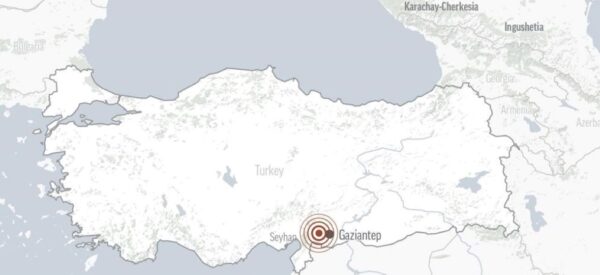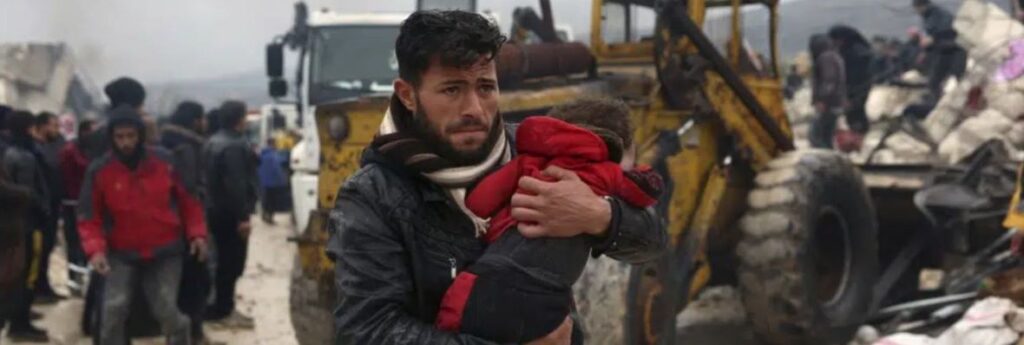A powerful 7.8 magnitude earthquake rocked wide swaths of Turkey and neighbouring Syria on Monday, killing more than 5,000 people and injuring thousands more as it toppled thousands of buildings and trapped residents under mounds of rubble.
Authorities feared the death toll would keep climbing as rescuers searched through tangles of metal and concrete for survivors in a region beset by Syria’s 12-year civil war and a refugee crisis.
Residents jolted out of sleep by the pre-dawn quake rushed outside in the rain and snow to escape falling debris, while those who were trapped cried for help. Throughout the day, major aftershocks rattled the region, including a jolt nearly as strong as the initial quake. After night fell, workers were still sawing away slabs and pulling out bodies as desperate families waited for news on trapped loved ones.
Tens of thousands who were left homeless in Turkey and Syria faced a night in the cold. In Turkey’s Gaziantep, a provincial capital about 33 km from the epicentre, people took refuge in shopping malls, stadiums and community centres. Mosques around the region were opened to provide shelter.
The quake, which was centered on Turkey’s southeastern province of Kahramanmaras, sent residents of Damascus and Beirut rushing into the street and was felt as far away as Cairo.
Turkish President Recep Tayyip Erdogan said officials do not know how high the number of dead and injured will rise.
The quake piled more misery on a region that has seen tremendous suffering over the past decade. On the Syrian side, the area is divided between government-held territory and the country’s last opposition-held enclave, which is surrounded by Russian-backed government forces. Turkey, meanwhile, is home to millions of refugees from the civil war.
Strained health facilities quickly filled with injured, rescue workers said. Others had to be emptied, including a maternity hospital, according to the SAMS medical organization.
 More than 6,400 people were rescued across 10 provinces, according to Orhan Tatar, an official with Turkey’s disaster management authority.
More than 6,400 people were rescued across 10 provinces, according to Orhan Tatar, an official with Turkey’s disaster management authority.
The region sits on top of major fault lines and is frequently shaken by earthquakes. Some 18,000 were killed in similarly powerful earthquakes that hit northwest Turkey in 1999.
The U.S. Geological Survey measured Monday’s quake at 7.8, with a depth of 18 km. Hours later, a 7.5 magnitude temblor struck more than 100 km.
Thousands of buildings were reported collapsed in a wide area extending from Syria’s cities of Aleppo and Hama to Turkey’s Diyarbakir, more than 330 km to the northeast.
In Turkey alone, more than 5,600 buildings were destroyed, authorities said. Hospitals were damaged, and one collapsed in the Turkish city of Iskenderun.
Bitterly cold temperatures could reduce the time frame that rescuers have to save trapped survivors, said Dr. Steven Godby, an expert in natural hazards at Nottingham Trent University. The difficulty of working in areas beset by civil war would further complicate rescue efforts, he said.
Offers of help — from search-and-rescue teams to medical supplies and money — poured in from dozens of countries, as well as the European Union and NATO. The vast majority were for Turkey, with Russian and even an Israeli promise of help to the Syrian government, but it was not clear if any would go to the devastated rebel-held pocket in the northwest.
More than 1,600 people were killed in 10 Turkish provinces, with more than 11,000 injured, according to Turkish authorities. The death toll in government-held areas of Syria climbed to 570 people, with some 1,400 injured, according to the Health Ministry. In the country’s rebel-held northwest, groups that operate there said the death toll was at least 450, with many hundreds injured.

